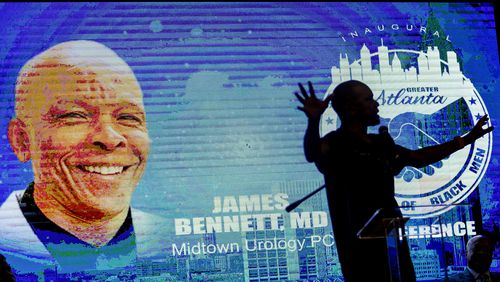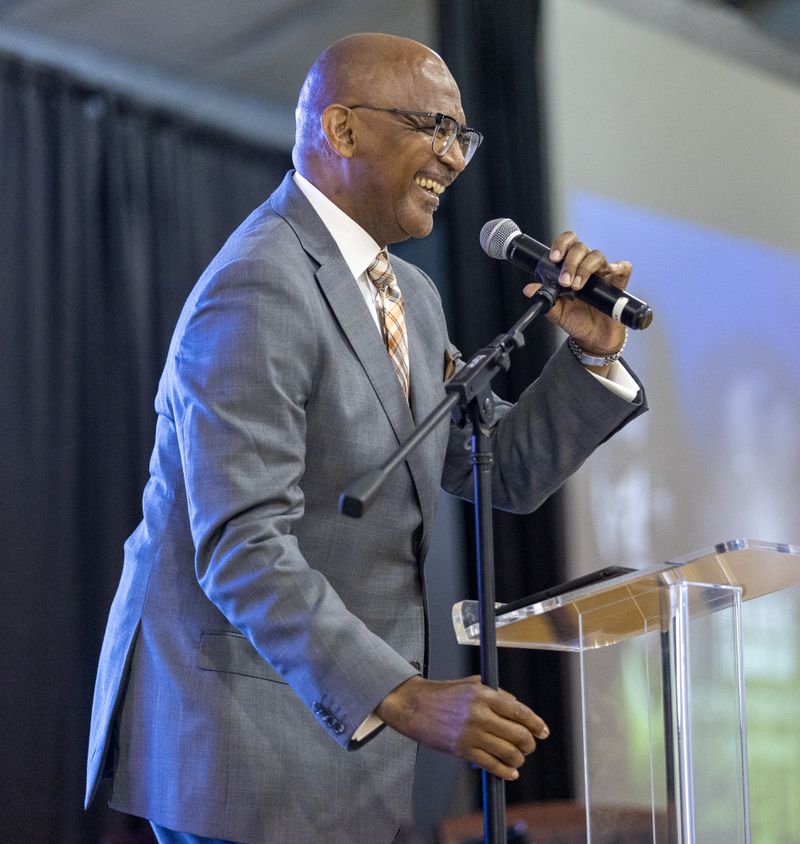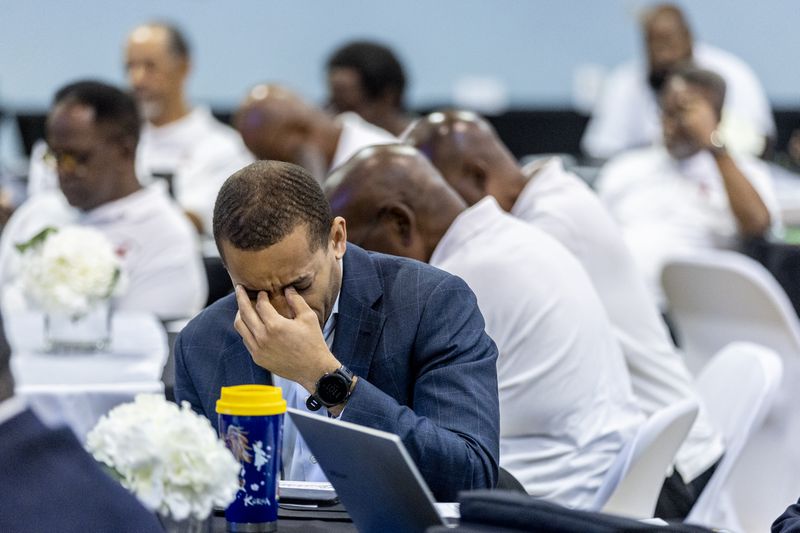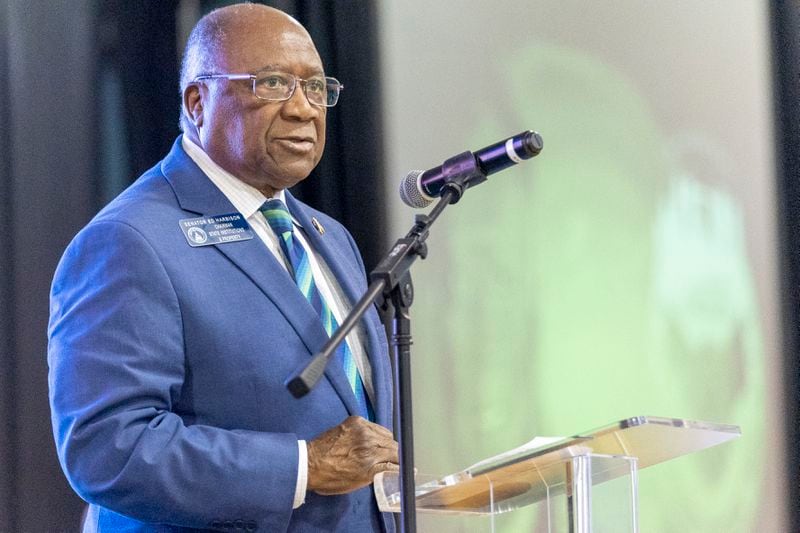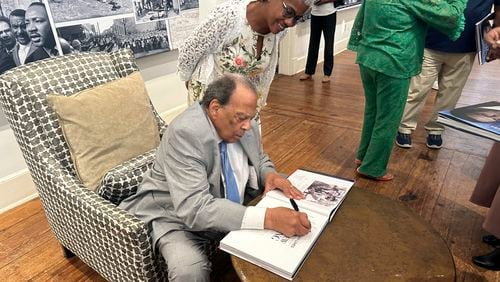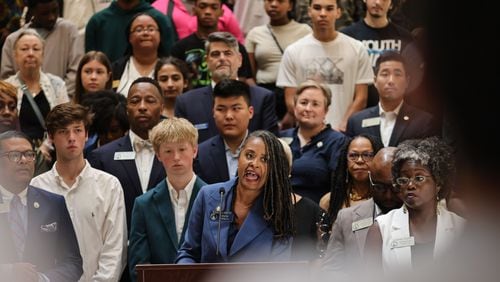Prominent African American leaders from across Georgia gathered at an Atlanta church Saturday to discuss the issues facing Black men and ways to support the next generation to overcome those challenges.
Politicians, law enforcement officials, religious leaders and doctors spoke at Mt. Ephraim Baptist Church as part of the inaugural Greater Atlanta Congress of Black Men conference. Topics of concern ran the gamut, from gun violence and education to health care and civic engagement.
Credit: Steve Schaefer /
Credit: Steve Schaefer /
The conference’s leaders said the initiative aims to grapple with the tough realities facing Black men, especially youths, and provide a forum to discuss community-focused strategies to mitigate problems that upend lives across the state.
“Our aim is to create a lasting change and achieve a brighter future for our community,” said Mt. Ephraim Rev. Lee C. Franklin. “It’s a movement that seeks to inspire, empower, uplift.”
Dozens of attendees congregated at the church, located at 1202 W. Marietta St. Many of the speakers recited lists of dour statistics to show how Black men have an uphill battle to overcome some of society’s largest issues, both in Georgia and across the country.
Cobb County Sheriff Craig Owens, the first African American elected to the job in Georgia’s third most populous county, said the majority of his inmates are Black men between 18 and 25.
“I have a serious issue with that,” Owens said. “What I would want is to try to catch these young men and women before they come and visit (the jail).”
He and other law enforcement leaders focused on police programs aimed at building trust with children, such as after-school programs. Austell Police Chief Scott Hamilton said those are vital initiatives, but he said many kids slip through the cracks, which can have dire consequences.
His officers responded to a shooting Friday where an altercation left a 15-year-old and 18-year-old mending gunshot wounds. Owens urged the conference’s younger attendees to find peaceful ways to settle disagreements without reaching for weapons — mirroring pleas made by other metro Atlanta law enforcement officials.
“Life is not a video game. There is no reset button,” Owens said. “Once you pull that trigger, you have ruined two Black lives. You’ve killed one and the other will go to prison for the rest of their life.”
Many of the speakers said Atlanta — as a mecca for Black culture, power and influence — should serve as a pioneer in solving some of the issues facing the African American community.
Credit: Steve Schaefer /
Credit: Steve Schaefer /
Some of that work is already happening in the health care industry, of which Black patients face several persistent disparities.
Black women in Georgia are twice as likely to die from pregnancy-related causes compared to white women, according to the state Department of Public Health. Black men face higher odds of developing type 2 diabetes, suffering kidney failure, hypertension, stroke and a litany of other adverse diseases, according to Dr. Frank Jones of the Morehouse School of Medicine. Life expectancy for Black men is 10 years shorter than for white men, while they also are far more likely than any other group to be victims of homicide.
Jones said the most practical solution to overcome those systemic issues is to support more Black health care professionals.
“We don’t have enough Black doctors,” he said. “Evidence shows that Black patients are healthier and live longer if they are cared for by Black doctors.”
He discussed a startup called the My Black Doctor Directory, which allows people to search for doctors in the Atlanta area. He hopes the director’s coverage area will spread statewide and to other major metros.
Credit: Steve Schaefer /
Credit: Steve Schaefer /
The conference was co-sponsored by the Urban League of Greater Atlanta and co-chaired by state Sen. Ed Harbison, D-Columbus, and state Rep. Omari Crawford, D-Decatur.
The elected officials spoke about the importance of getting younger African Americans civically involved. From encouraging voter participation to reducing incarceration rates, the elected officials said those efforts take root at a community level.
“These statistics are heartbreaking to consider,” Harbison said. “Black Georgians are some of our state’s most valued contributors… it’s up to us to find a way to combat crime and find equitability.”
About the Author
